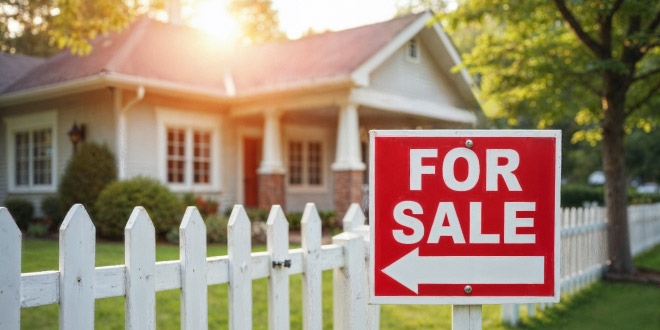Discover cheap homes for sale near me and learn insider tips on finding affordable properties, from fixer-uppers to foreclosures, without breaking the bank!
Introduction
Looking for cheap homes for sale near me can feel both exciting and intimidating. Maybe you’re a first-time homebuyer on a tight budget, or perhaps you’re hunting for a bargain property to fix up and flip. Whatever your motivation, the world of affordable real estate is broader and more accessible than you might think. In this guide, we’ll break down the different types of low-priced houses, the best ways to find them, and the steps you’ll need to take to ensure a smooth purchase. Ready to begin your quest for a budget-friendly home? Let’s dive in!
Table of Contents
Why Look for Cheap Homes for Sale Near Me?
There are plenty of reasons why buyers seek affordable homes:
- Lower monthly mortgage payments can free up funds for other goals, like saving for retirement or traveling.
- Less financial risk, especially if you’re new to homeownership or concerned about job stability.
- Opportunities to build equity quickly if you’re willing to invest in a property that needs minor (or major) renovations.
- Flexibility for first-time buyers, who can learn the ropes of real estate without committing to a huge mortgage.
Sometimes, cheaper doesn’t mean worse—especially if you find a diamond in the rough in an up-and-coming area or snag a property with cosmetic issues that are easy to fix.
Types of Affordable Homes
3.1 Foreclosures & Short Sales
Foreclosures and short sales are often associated with lower prices. They occur when:
- Foreclosure: The previous owner defaulted on the mortgage, and the bank repossessed the house.
- Short sale: The homeowner owes more on the mortgage than the property’s current market value, so the lender agrees to sell at a discount.
Pros:
- Potentially deep discounts below market value.
- Motivated sellers (banks, lenders) who want to offload the property.
Cons:
- Properties might be in disrepair due to neglect or vandalism.
- The buying process can be longer and more complex.
3.2 Fixer-Uppers & Discounted Properties
A fixer-upper is a property that needs repairs or renovations, ranging from minor cosmetic updates to major structural work. They’re often:
- Priced below market to account for needed improvements.
- Attractive to handy buyers who can do DIY projects or hire affordable contractors.
If you’re open to some elbow grease, a fixer-upper could be your ticket to a bargain home with big potential returns. Just be sure to budget for renovations and unexpected surprises.
3.3 Small Houses & Starter Homes
Small houses, including starter homes, are generally more affordable due to limited square footage. These properties can be:
- Perfect for singles, couples, or small families who don’t need a ton of space.
- Easier to maintain and cheaper to heat, cool, or renovate.
Starter homes can be a stepping stone, letting you build equity before upgrading to a bigger place down the line.
3.4 Condos, Townhouses & Mobile Homes
If a single-family home isn’t a must, consider:
- Condos: Often located in more urban or semi-urban areas, with shared amenities like gyms or pools.
- Townhouses: Combine the feel of a single-family home with lower maintenance, as some exterior upkeep is covered by the HOA.
- Mobile homes: A budget-friendly option, especially in rural areas or mobile home parks, though land ownership might be separate.
Each option has its own lifestyle and financial implications—condos and townhouses typically involve HOA fees, while mobile homes may require you to rent a lot.
3.5 Rural Properties & Up-and-Coming Neighborhoods
Don’t overlook rural areas or neighborhoods on the verge of revitalization. In these locales:
- Land is cheaper, so you might snag a larger property at a fraction of the cost of a city lot.
- Up-and-coming neighborhoods can see property values rise over time, providing a strong investment opportunity if you buy early.
Just make sure you’re prepared for longer commutes or fewer amenities—rural living isn’t for everyone.
Where to Find Cheap Homes
4.1 Online Platforms & Websites
Zillow, Redfin, Trulia, Realtor.com, and even Craigslist are go-to online resources. Many allow you to filter for “lowest price first” or set a maximum price. Also look for filters like “fixer-upper” or “foreclosure” to narrow your search.
Pro Tip: Sign up for email alerts on your favorite platform so you can act quickly when a new listing that fits your criteria goes live.
4.2 Local Real Estate Agents & Word of Mouth
A seasoned real estate agent who specializes in budget-friendly properties can be invaluable. They may know of off-market deals or motivated sellers who haven’t listed publicly. Sometimes a simple conversation with neighbors or friends can lead you to a hidden gem not widely advertised.
4.3 Government Programs & Auctions
Government agencies occasionally sell discounted homes through auctions or special programs. For instance:
- HUD Homes: Foreclosed properties insured by the Federal Housing Administration (FHA).
- USDA Loans: For rural properties, offering low or no down payment options.
- FHA Loans: Lower down payment requirements, helpful for first-time buyers.
Check official websites or local listings to see what’s available in your area.
Evaluating Budget-Friendly Properties
5.1 Location & Community Factors
Cheap doesn’t always mean a bad location. Some areas are simply less discovered or in the early stages of growth. Evaluate:
- Crime rates and local amenities (shops, restaurants, healthcare).
- School district quality, if you have kids or plan to in the future.
- Public transport or highway access, especially if you commute.
Up-and-coming neighborhoods might show signs of new development, rising property values, and local business expansion.
5.2 Property Condition & Home Inspection
Never skip a home inspection, especially when eyeing a discounted property. Watch out for:
- Major structural issues like foundation cracks or roof damage.
- Electrical or plumbing problems that can be costly to fix.
- Signs of neglect or hidden damage behind cosmetic updates.
If you’re unsure about the scope of repairs, consult a contractor or a specialized inspector (e.g., for mold or pests) before committing.
5.3 Financing Options & Mortgage Assistance
Securing an affordable mortgage is key. Explore:
- Low down payment loans via FHA, VA, or USDA programs.
- Down payment assistance for first-time buyers, often offered by state or local governments.
- Seller concessions: Some motivated sellers might help cover closing costs or minor repairs.
Don’t forget to factor in property taxes, homeowner’s insurance, and potential HOA fees into your monthly budget.
Negotiation & Closing the Deal
6.1 Offer Strategies & Motivated Sellers
When dealing with cheap homes for sale near me, you might encounter sellers eager to finalize a sale quickly. Consider:
- Offering a quick closing if you’re pre-approved and ready to move.
- Asking for concessions, like covering closing costs or leaving appliances behind.
- Being flexible with move-in dates to sweeten the deal.
Motivated sellers are often open to negotiations that benefit both parties—just be respectful and realistic.
6.2 Dealing with Distressed Properties
Distressed properties (foreclosures, short sales, or homes with serious issues) can yield significant savings but come with extra hurdles:
- Extended timelines: Banks can be slow to respond in short sale or foreclosure scenarios.
- “As-is” sales: You might have to fix everything yourself, from leaky roofs to faulty wiring.
- Title issues: Ensure the property has a clear title to avoid legal headaches later.
If you’re up for the challenge, distressed properties can be a path to below market value homeownership.
6.3 Closing Costs & Final Steps
Closing costs typically range from 2-5% of the purchase price and can include:
- Loan origination fees
- Appraisal costs
- Title insurance
- Recording fees
- Attorney fees (in some states)
Review the Closing Disclosure thoroughly, and don’t hesitate to question any unexpected fees.
Real-World Examples & Personal Anecdotes
- Case Study: The Thompson Family
- Scenario: The Thompsons were renting a two-bedroom apartment but dreamed of a bigger yard for their kids. With a tight budget, they searched online and found a fixer-upper in a small town just 30 minutes from the city.
- Outcome: The property needed a new roof and some interior work, but the discounted price left room for renovations. After six months of sweat equity, they turned the house into a cozy home, and it’s already increased in value.
- Personal Anecdote: I once toured a foreclosed house listed at half the market rate. It needed a fresh coat of paint, new carpets, and some landscaping love. Although I passed due to my limited renovation skills, a friend jumped on it. A year later, he sold it for a decent profit—proof that well-researched cheap homes can pay off.
Expert Quotes & Insights
“When searching for cheap homes, always factor in future repair costs. A low purchase price can quickly balloon if you’re dealing with major structural issues.”
— Linda Harris, Licensed Home Inspector
“Don’t shy away from smaller houses or rural areas. They often provide the best bargains, especially if you’re open to a bit of a commute.”
— Carlos Gutierrez, Real Estate Agent
FAQs
Q1: Are cheap homes for sale near me always in bad neighborhoods?
- Answer: Not necessarily. Some affordable properties are in up-and-coming areas or simply smaller homes in decent neighborhoods. Always research crime rates, school districts, and local amenities to confirm.
Q2: How do I finance a fixer-upper if I don’t have a big renovation budget?
- Answer: Look into FHA 203(k) loans or other rehab mortgages designed for properties needing repairs. These loans roll the renovation costs into your mortgage.
Q3: Can I buy a foreclosed home without a real estate agent?
- Answer: Technically, yes, but an agent familiar with foreclosures can guide you through complexities and help you avoid pitfalls like title issues or hidden liens.
Q4: What’s the difference between a short sale and a foreclosure?
- Answer: In a short sale, the homeowner is still involved, trying to sell for less than they owe. A foreclosure means the bank has taken full control of the property.
Q5: Should I hire a professional for a home inspection if the house is really cheap?
- Answer: Absolutely. A thorough inspection can save you from costly surprises, even if the home’s price seems like a steal.
Q6: Are rural properties cheaper than suburban or urban ones?
- Answer: Often, yes, because land is more abundant and demand might be lower. However, factor in commuting distances, fewer amenities, and potentially higher utility or septic costs.
Q7: What are typical closing costs on a cheap house?
- Answer: Closing costs usually range between 2% and 5% of the purchase price. Even on a cheaper property, these can add up, so budget accordingly.
Q8: Where can I find information on government home-buying programs?
- Answer: Check official sources like HUD.gov or your state’s housing authority website for details on grants, loans, and assistance programs.
Key Takeaways
- Cheap homes for sale near me come in various forms—foreclosures, short sales, fixer-uppers, and smaller properties.
- Don’t dismiss a bargain house: With the right research, you can find a safe, comfortable home at a fraction of the usual cost.
- Online platforms like Zillow, Redfin, Trulia, and Realtor.com can streamline your search.
- Home inspections and thorough research are vital to avoid hidden pitfalls.
- Financing options abound, from FHA loans to down payment assistance.
- Negotiation skills and understanding of distressed properties can help you secure a below market value deal.
- Always weigh location factors—commute times, neighborhood safety, school districts, and future growth potential.
Conclusion & Call to Action
Securing cheap homes for sale near me doesn’t have to be a daunting task. With a clear strategy—whether you’re focusing on foreclosures, fixer-uppers, or smaller starter homes—you can land a property that suits your budget and lifestyle. The key is to stay informed, be patient, and remain flexible about the type of home or location you choose.
Ready to jump into the market?
- Explore Listings: Start with online portals or local real estate agent recommendations.
- Set a Budget: Get pre-approved for a mortgage and factor in closing costs and repairs.
- Stay Alert: Sign up for property alerts, especially for new foreclosures or short sales in your area.
- Learn & Adapt: Every viewing or negotiation is a learning experience, so keep refining your approach.
If you’ve found a hidden gem or have tips on finding affordable homes in your community, drop a comment below. Let’s build a supportive space where everyone can share success stories, lessons learned, and practical advice on scoring the best deal possible in today’s real estate market!
 NexMove Home & Investment Guide Find Your Perfect Property, Invest Wisely.
NexMove Home & Investment Guide Find Your Perfect Property, Invest Wisely.





